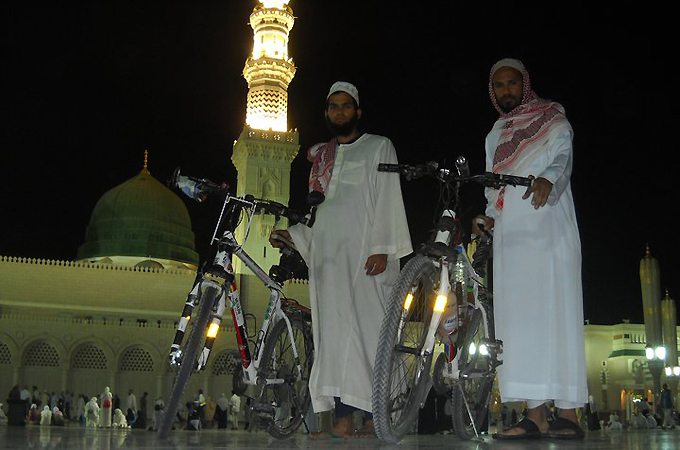Source: Aljazeera.net

The idea began as a hypothetical situation – what would happen if a few friends attempted to bicycle from their home in South Africa to the Muslim holy city of Mecca in Saudi Arabia in time for the annual Hajj pilgrimage?
Twelve countries, nine months and untold kilometres of freshly traveled earth behind them, the hypothetical has become a reality for Cape Town residents Nathim Cairncross, 28, and Imtiyaz Ahmad Haron, 25.
The two pedalled their way across the Saudi border in late October, arriving nearly three weeks before the official start of the Hajj, the annual Muslim pilgrimage to the Kaaba in Mecca.
The pilgrimage, which falls during the last month of the Islamic calendar and begins on November 14 this year, is a rite that forms one of the five pillars of Islam and is mandatory for able-bodied Muslims of means at least once in their lifetime.
The two began planning their journey in December, shortly after Haron floated the idea to Cairncross, his friend of nearly seven years. Haron had been reading up on the Hajj, which draws about two million Muslims to Saudi Arabia annually.
Inspired by the stories of pilgrims that had made the arduous journey to Mecca before him, Haron decided that he wanted to join their ranks and enlisted Cairncross to come along – with a twist. The two would make the trek using only their bicycles.
“In life there’s a consistent principle for me,” Cairncross told Al Jazeera.
“If I work very hard for something, at the end of the day it’s sweeter; I value it more. After nine months [cycling] through Africa and the Middle East – of course, I value it more.”
Training for the trek
Their journey began on February 7, on a cold and rainy morning at a mosque in Cape Town, where nearly 500 people had gathered to bid them farewell and pray for their well being.
Escorted about 70km out of town by local cycling clubs supporting their effort, the two were then left alone to traverse the road ahead using their maps, their bicycles and sheer determination.
“We’re not professional bike riders,” Cairncross said. “But we did physical training – increased exercises – two months before, going up the mountains [of Cape Town], running on the beach, swimming.”
Even as they trained for the trek, Haron and Cairncross also had to combat the naysayers, who discouraged them from embarking on the ride, and others who did not think the two would go through with the plan.
Undaunted, the friends plotted their itinerary, consulted the South African traffic department to ensure they could use the roads, researched visa entry rules, and sought medical advice from doctors, who “diagnosed us as crazy”, the two said.
Word soon began to spread of their plan, and their story caught the attention of local radio stations. Once their journey began, those stations kept in touch with the riders, calling them periodically to check in on how the ride was progressing, and reporting back to listeners in Cape Town.
The support helped buoy them through their long journey, across Botswana, Zimbabwe, Mozambique, and the green peaks of Malawi.
Kindness of strangers
They cycled 80-100km per day, starting after the pre-dawn Muslim prayer, and stopping at night at hotels, campsites, or mosques, where they would tell their story to welcoming listeners who would then invite them to stay the night and eat a meal.
They made friends along the way – locals, other cyclists and tourists curious about their journey. Haron and Cairncross welcomed the curiosity, seeing it as an opportunity to explain Islam, Hajj, and why they intended to perform the pilgrimage.
“On the ground you can speak to the people,” Cairncross said.
“You get an opportunity that traveling by plane or car you don’t get. And you learn much more, you discover much more about yourself. It was an existential experience.”
However, speaking to people posed a challenge in some countries, where the number of English-speakers was few, and language represented a barrier. Refusing to let that hinder them, Haron and Cairncross began to pick up the basics of the languages they encountered, consulting with locals and researching when they could find an internet connection.
In addition to the language barriers, the two faced minor technical problems – tire punctures, broken chains, and cushion malfunctions. But they said safety was never an issue, and despite their limited budget they always managed to find food and shelter.
Get the full article here >>: Aljazeera.net








